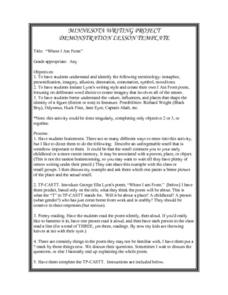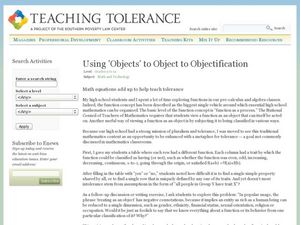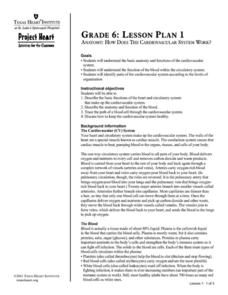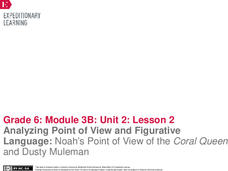Curated OER
Poetry: What's on Your Plate (Part 2)
Middle schoolers write a short paragraph using strong descriptions. In this using modifiers lesson, students define modifier, adjective, adverb, metaphor, and simile. Middle schoolers then write a journal entry in which they write...
Curated OER
Painting Pictures with Poetry
Students develop their own smilies and metaphors. They examine writing of the Poet Laureate. They identify philanthropy in quotations of others.
Curated OER
Taxation Without Representation
Eighth graders empathize with how colonists felt when they were taxed without representation. They use a metaphor of students and a school principal to describe the strained relationship that developed between the colonies and Britain.
Curated OER
A Toast to Our Community
Young scholars bake bread with a dual purpose: to explore, through the metaphor of baking bread, the potential dynamics and purposes of a classroom, and to begin investigating the idea that everyday things are connected to the...
Curated OER
Where I Am From
Students study selected poetry to gain an understanding of influences on values and personal identity. They explore language terms such as personification, imagery metaphors and allusion. After reading a poem and discussing it,...
Curated OER
Ode to a Nightingale
Learners read poems about Tuberculosis by John Keats. Using the poems, they identify similies, metaphors, personification and imagery. In groups, they make connections about the author's outlook on life and how his disease impacted his...
Curated OER
Presenting the Geologic Timescale
Students model the geologic timescale using distance as a metaphor for time. They write a summary of a major event or fossil organism. and station themselves and their summaries along a path within a gymnasium, and present their...
Curated OER
From Ordinary To Extraordinary Writing
Students investigate the quality of writing while focusing on the use of sensory words to convey meaning and ideas. The power of similes and metaphors is emphasized while they create and edit works of writing. The skill of descriptive...
Curated OER
Using Objects to Object to Objectification
Young scholars use math functions in part to complete a metaphorical lesson on tolerance. In this math and tolerance lesson, students receive rows of functions and try to find a single simple shared property without success. Young...
Curated OER
I Know Why the Caged Bird Sings
Students use Maya Angelou's novel, I Know Why the Caged Bird Sings to identify themes about adversity in the text. In this adversity, students read chapter 36 of the novel and discuss the examples of adversity in the book. Students...
Curated OER
Chalkboard Challenge: Literary Terms
This interactive PowerPoint simulates a "Jeopardy" game that addresses figurative language, cause and effect, and other literary terms. Players can chose which category and amount they would like to play on the Game Board.
Texas Heart Institute
Anatomy: How Does the Cardiovascular System Work?
How can the circulatory system compare to a city map? Pupils distinguish the "roadways" and "vehicles" of the cardiovascular system, compare the anatomy and function of veins and arteries, and review different types of blood cells with...
Scholastic
Choose Your Words Wisely (Grades 9-12)
Words, words, words. The function of words in persuasive writing is the focus of a group activity that asks members to analyze how words advertisers use are designed to influence targeted audiences.
Curated OER
Genre Lesson: Poetry
Hook kids into a study on poetry elements by asking them to bring in the lyrics to their favorite song. Discuss the elements in one or two songs (preferably that demonstrate rhyme, figurative language, or a repeating phrase). Groups do...
TED-Ed
What is the World Wide Web?
Did you know that the World Wide Web and the Internet are not the same thing? Did you know that Tim Berners-Lee is considered the father of the Web? Networks, web servers, web hosts, website addresses, domain names, web languages,...
City University of New York
Electoral College
A presidential election is a lot like the 2004 World Series, and it's also a lot like choosing an orange in a paper bag. Apply the process of the electoral college to these two analogies with a set of lessons about government...
K5 Learning
The Blind Men and the Elephant
Sometimes it's necessary to view the whole picture before making a judgment about a small part. Read a short story about five blind men who try to identify an elephant by feeling different parts and coming to their own conclusions....
Poetry4kids
How to Write an Exaggeration Poem
The best poetry writing lesson of all time is here for you! Learn all about the art of exaggeration with a lesson on exaggeration poems, which instructs students to use wild imagery to convey their message.
Shakespeare Globe Trust
Much Ado About Nothing
Love, deception, witty bante—that's much ado about a lot! As learners navigate the resource, they view an interactive character map and read character biographies from Shakespeare's Much Ado About Nothing. Pupils also listen to...
Shakespeare Globe Trust
Macbeth
Why do characters do what they do? Scholars use the resource to explore character motivation in Shakespeare's tragedy Macbeth. Additionally, they discover pictures, interviews, and videos from the Deutsche Bank production of the play.
EngageNY
Grade 11 ELA Module 1: Unit 2, Lesson 15
Scholars continue reading Act 3.1 from Shakespeare's Hamlet, discovering Ophelia's monologue about Hamlet. They complete a Quick Write to analyze Ophelia's perspective of Hamlet and participate in an optional jigsaw activity to explore...
EngageNY
Analyzing Point of View and Figurative Language: Noah’s Point of View of the Coral Queen and Dusty Muleman
Literally, what's the meaning? Scholars read pages seven through nine of Flush and discuss literal and nonliteral meaning with figurative language. Learners work in triads to identify and define unfamiliar words. They then complete a...
Lions Clubs International Foundation
Mindful Self-Management Exercise: Managing Stress
Let it go! As part of the Mindfulness series, pupils learn a technique to manage stress and strong emotions. While doing the deep breathing exercise, they imagine a train of stressful thoughts, take a step back, and let the train pass.
Curated OER
"The Story of an Hour" Lesson 3: Teacher's Guide and Notes
The third lesson in "The Story of an Hour" series introduces young readers to analogies; a literary device writers use to add depth to their stories. Instructors identify the three analogies in the tale, and class members consider the...
Other popular searches
- Similes and Metaphors
- Metaphors in Music Lyrics
- Examples of Metaphors
- Simile and Metaphors
- Similies and Metaphors
- Poetry Similes and Metaphors
- Similes Metaphors
- Personal Metaphors
- Similes Metaphors Powerpoint
- Metaphors Rap Music
- Winter Simile and Metaphors
- Color Poems Using Metaphors

























